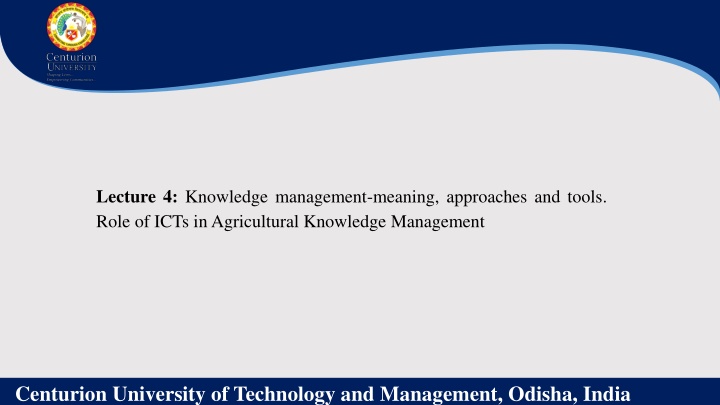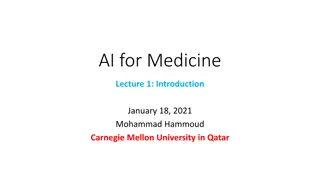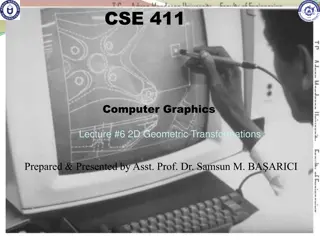
Enhancing Agricultural Knowledge Management with ICT Tools
Explore the role of knowledge management in agriculture, leveraging ICT tools for data collection, knowledge sharing, decision support, and capacity building. Learn about the importance of digital repositories, databases, mobile applications, and collaboration in promoting efficient agricultural practices. Centurion University of Technology and Management in Odisha, India, provides insights on leveraging technology for agricultural knowledge management.
Download Presentation

Please find below an Image/Link to download the presentation.
The content on the website is provided AS IS for your information and personal use only. It may not be sold, licensed, or shared on other websites without obtaining consent from the author. If you encounter any issues during the download, it is possible that the publisher has removed the file from their server.
You are allowed to download the files provided on this website for personal or commercial use, subject to the condition that they are used lawfully. All files are the property of their respective owners.
The content on the website is provided AS IS for your information and personal use only. It may not be sold, licensed, or shared on other websites without obtaining consent from the author.
E N D
Presentation Transcript
Lecture 4: Knowledge management-meaning, approaches and tools. Role of ICTs in Agricultural Knowledge Management Centurion University of Technology and Management, Odisha, India
Knowledge Management Knowledge management is the deliberate and systematic coordination of an organization s people, technology, processes, and organizational structure in order to add value through reuse and innovation. Knowledge management is acting as an important tool for the organizations to improve productivity, to get better return on investment and generate competitive advantage. Centurion University of Technology and Management, Odisha, India
Knowledge management (KM) in ICT in agriculture is the process of capturing, organizing, storing, and sharing agricultural knowledge using ICT. This can be done through a variety of methods. Building knowledge repositories: This involves creating databases of agricultural knowledge, such as weather data, crop information, and pest management techniques. Developing knowledge sharing platforms: This involves creating online platforms where farmers, researchers, and other agricultural professionals can share knowledge. Using ICT to deliver agricultural training: This involves using ICT to deliver agricultural training courses, such as online courses or SMS-based courses. Using ICT to support agricultural decision-making: This involves using ICT to help farmers make informed decisions about their businesses, such as by providing them with access to weather forecasts or market prices. Centurion University of Technology and Management, Odisha, India
Tools Databases: Databases are a great way to store and organize large amounts of agricultural knowledge. They can be used to store data on weather, crops, pests, and other agricultural topics. Content management systems: Content management systems are a great way to create and manage websites and online portals. They can be used to create knowledge-sharing platforms and to deliver agricultural training courses. Decision support systems: Decision support systems are a great way to help farmers make informed decisions about their businesses. They can be used to provide farmers with access to data on weather, markets, and other factors that can affect their businesses. Mobile apps: Mobile apps are a great way to deliver agricultural knowledge to farmers. They can be used to provide farmers with access to weather forecasts, crop information, and other agricultural data. Centurion University of Technology and Management, Odisha, India
Role of ICTs in Agricultural Knowledge Management Data Collection and analysis Knowledge Sharing and Dissemination Digital Repositories and Databases Decision Support Systems Capacity Building and Training Collaboration and Networking Monitoring and Evaluation Mobile Applications and ICT Tools Centurion University of Technology and Management, Odisha, India











